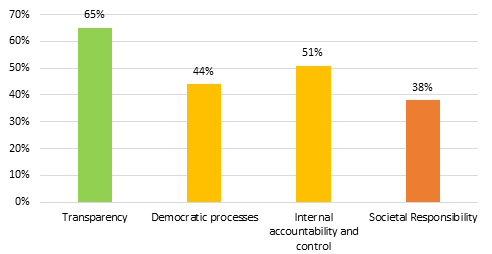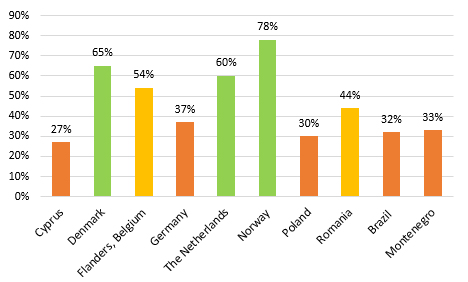Play the Game receives a positive evaluation of the NSGO project
In November 2018, the National Sports Governance Observer (NSGO) launched its main results at a high-profile event in Leuven. The seminar presented the highlights of the two-year-long project and revealed that the level of sports governance varies a lot across European states. Recently, the Education, Audiovisual and Culture Executive Agency (EACEA), which is the organ responsible for managing most parts of the EU’s funding programmes including Erasmus+ projects, gave its evaluation of the project.
It awards 87 out of 100 possible points, concluding that “the project has a big impact on the participants and participating organisations working directly in the project. The project shows a relatively big impact also outside of the organisations and individuals directly participating in the project at national, European but also international level both during and after the project lifetime.”
“It is of course a great encouragement for us and for our partners in the project, and it gives a boost to our continued efforts to expand the international benchmarking to new countries,” says Jens Sejer Andersen, international director of Play the Game.
With EU support, the project included sports leaders and academic researchers from eight European countries – Belgium (Flanders), Cyprus, Denmark, Germany, Netherlands, Norway, Poland, and Romania.
Thanks to additional support from the Council of Europe and the Danish parliament, Brazil and Montenegro could be added to the project from the start.
Backed by the positive evaluation, Play the Game will continue its work on the project as more countries are going through the NSGO and at the Play the Game 2019 in Colorado Springs in October. It is expected that Australia, Canada, Colombia, Georgia, Lithuania, and the USA will present their results.Countries such as Albania, Serbia, Spain and Portugal are on their way in the near future.
Play the Game has also embarked on a new Erasmus+ project entitled National Anti-Doping Governance Observer (NADGO) that will assess the state of governance across national anti-doping agencies. The project is set to run for the next two years and conclude November 2021
The NSGO investigates four dimensions: 1) Transparency, 2) Democratic processes, 3) Internal accountability and control and 4) Societal responsibility. Transparency is the dimension in which the nine European countries achieve the best average score namely 65%. It is followed by the democracy and accountability dimensions at 44% and 51%, respectively. The average NSGO score on the societal responsibility dimension is 38%. On average, the surveyed European federations thus have the most deficits in the democracy and societal responsibility dimension.
Figure 1: Average score – all countries – on the four NSGO dimensions

Overall, the average score of the NSGO country indexes of the nine European countries is 47%, which corresponds to a ‘moderate’ scoring label. Sports federations in Norway, Denmark, and the Netherlands mostly achieve ‘good’ to ‘very good’ scores. Flemish federations generally achieve average to good scores. The federations in the other countries achieve mostly ‘moderate’ to ‘weak’ scores.
Figure 2: Overall NSGO index scores – all countries

Further reading






